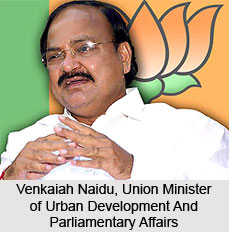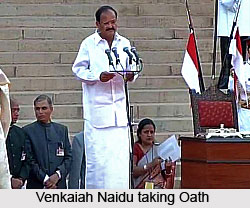 Venkaiah Naidu is an Indian politician hailing from Andhra Pradesh. A prominent leader of Bharatiya Janata Party, after the glorious victory in Indian General Election conducted by Election Commission of India in the year 2014, he is currently in the chair of Union Cabinet Ministry of Urban Development and Parliamentary Affairs.
Venkaiah Naidu is an Indian politician hailing from Andhra Pradesh. A prominent leader of Bharatiya Janata Party, after the glorious victory in Indian General Election conducted by Election Commission of India in the year 2014, he is currently in the chair of Union Cabinet Ministry of Urban Development and Parliamentary Affairs.
Early Life of Venkaiah Naidu
Venkaiah Naidu was born on 1st July 1949 served the position as a National President of Bharatiya Janata Party from the year 2002 to 2004. Earlier, he was the Union Cabinet Minister for Rural Development in the Government of Atal Bihari Vajpayee. Muppavarapu Venkaiah Naidu better known as Venkaiah Naidu is hailing from Chavatapalem, Nellore, Andhra Pradesh in a Kamma family (Kamma or Kammavaru is a community group found largely in the southern states of Andhra Pradesh, Tamil Nadu and Karnataka). Muppavarapu Venkaiah Naidu completed his schooling from V.R. High School, Nellore. Later he pursued his Bachelor`s Degree in Politics and Diplomatic Studies from V.R. College and passed with flying colours. Later, he acquired a Bachelor`s degree in Law with specialization in International Law from Law College, Andhra University located in Visakhapatnam.
Political Life of Venkaiah Naidu
Venkaiah Naidu, in the early life was closely associated with the Rashtriya Swayamsevak Sangh (RSS). He started his career in politics as a student leader of the Akhil Bharatiya Vidyarthi Parishad (ABVP) in the year 1973-74. There he was elected as President of the Students Union of Andhra University Colleges. In 1974, he became the Convener of Lok Nayak Jayaprakash Narayan Kshatra Sangharsha Samiti of Andhra Pradesh. In his early political career, he participated in the Anti- Emergency struggle, during the Prime Ministership of Indira Gandhi. From 1977-80, he was President of the Youth Wing of the Bharatiya Janata Party.

Rise to Fame
He came in to the limelight of national political sky when he became the President of the Students Union of Andhra University Colleges. Both as a student leader and political figure, Venkaiah Naidu gained prominence as a luminous speaker and a good orator, who energetically championed the cause of the farmers and the development of economically and socially backward areas in India. The oratory skills and political activism of Muppavarapu Venkaiah Naidu propelled his political career. For that, he became an MLA (Member of Legislative Assembly) to the Andhra Pradesh Legislative Assembly twice from Udayagiri constituency in Nellore district in 1978 and 1983. He rose to become one of the most admired and famous leaders of the Bharatiya Janata Party (BJP) in Andhra Pradesh.
After having served in various organisational posts of the Bharatiya Janata Party (BJP) at the state and national level, he was elected as a member of the Rajya Sabha from Karnataka in 1998. Venkaiah Naidu has since been re-elected twice in 2004 and 2010 from Karnataka, which is the only stronghold of the BJP in Southern India.
When National Democratic Alliance (NDA) got victorious in the Indian general elections 1999, Venkaiah Naidu became the Union Cabinet Minister for Rural Development in the Government headed by the Atal Bihari Vajpayee. He was known for aggressively pushing for reforms in Rural Development in India and for the many schemes introduced during this period such as the "Pradhan Mantri Gram Sadak Yojana" Pradhan Mantri Gram Sadak Yojana, better known as PMGSY is a nationwide plan in India to provide good all-weather road connectivity to unconnected villages of India.
There after Venkaiah Naidu succeeded Jana Krishnamurthy as the National President of the Bharatiya Janata Party in 2002. On January 28, 2004, he was elected unopposed for a full 3 year term. After the defeat of the Bharatiya Janata Party led National Democratic Alliance (NDA) in the 2004 Indian General Elections, he resigned from his post on October 18, 2004 and was succeeded by Lal Krishna Advani, who was the most powerful and most influential anti Congress Indian politician of India. However, he has remained in the forefront of the BJP as one of its Senior Vice Presidents and an important campaigner. On 26th May 2014, Venkaiah Naidu has sworn as the Minister for Urban Development and Parliamentary Affairs in Narendra Modi`s Brigade.






